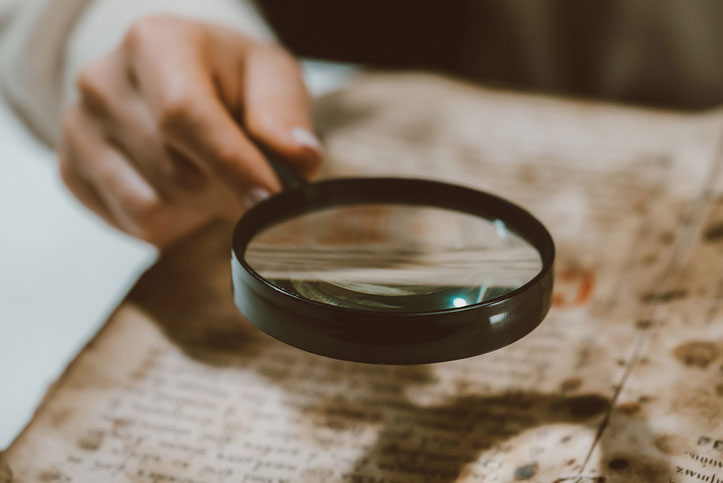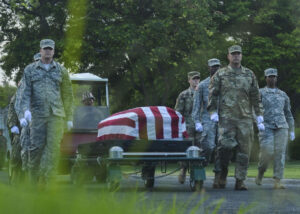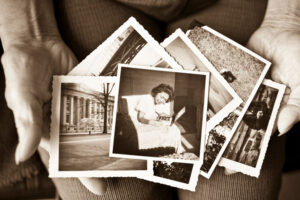

History is happening all the time.

One day, everything that we have seen or experienced in our lives, from the attempted insurrection on January 6th to the COVID-19 pandemic, will end up as a page or a paragraph in high school social studies classes. Even the commonplace will become historical; historians will one day catalog the trends and importance of Facebook posts and Instagram memes.
Maybe even things we don’t think or know about today will become historically huge: Gregor Mendel’s humble experimentation in breeding pea plants received almost no notice when he was alive, but historians discovered and elevated his work to mark one of the key turning points into a world where DNA analysis and gene therapy have become enormously important.
But those students won’t be seeing the same headlines in the same ways that we see them today. They’ll be learning about all of these events within the broader scope of what has followed, and with the benefit of perspective we don’t yet have.
Who puts these events in that context? Historians, that’s who.
It’s the job of historians to deliver not just the raw stuff of history, the dates and places and events that happened, but to also give modern audiences the reasons those things were important and relevant to life and society both today and yesterday.
Their training allows them to draw connections between historical events and how the world exists as those events shaped it. They put themselves, and their students, in the shoes of generations who came before and draw understanding from those comparisons.
Those who cannot remember the past are condemned to repeat it.
~ Georges Santayana
It’s not just for the satisfaction of understanding what came before, either. Historians have real and important contributions to make to today’s world, by sharing and comparing patterns and events from the past that reflect similar situations of today. But while we can’t know the results of decisions we make today, historians can show us what is likely to happen based on what has happened before.
Everyone gains perspective over time on the events of the past, but historians actively study perspective. And that kind of far-ranging introspective ideal is a perfect fit for the world of liberal studies, which encourages a diversity of views and the use of comparative ideas to shed light on both history and modernity.
History Degree Jobs Emerge in Surprising Places
One thing you learn pretty quick in liberal studies is just how important history is in every aspect of modern life. Every industry, every country, every profession is building on a foundation of knowledge and practice that was built by those who came before.
So, you can find jobs involving history in a surprisingly diverse array of fields. Of course, there are all the usual jobs you would expect to find, like museum of natural history jobs or art history jobs.
But you can also find historians working in some unlikely places. That could include major corporations like Raytheon and Boeing, consulting on records preservation and document analysis to catalog the development of technologies as a way to defend patent claims. Historians work with construction companies building on lands where artifacts may be found and must be preserved. You can find historians who work at investment firms, helping to value assets of a historical nature. There are jobs for history degree holders in government!
 In a nondescript laboratory on a military base in Hawaii, a group of historians daily comb through records of bombing missions, of witness testimony, after-action reports, even recordings of radio transmissions made during combat. Their job: attempt to identify human remains still being discovered in war zones from the records of those who went missing, and to identify areas to send search teams to look for those remains to return lost soldiers to their loved ones.
In a nondescript laboratory on a military base in Hawaii, a group of historians daily comb through records of bombing missions, of witness testimony, after-action reports, even recordings of radio transmissions made during combat. Their job: attempt to identify human remains still being discovered in war zones from the records of those who went missing, and to identify areas to send search teams to look for those remains to return lost soldiers to their loved ones.
By comparing materials and maps, these historical sleuths track down last known sightings of missing military members and put together the pieces from confused firefights and aerial battles that happened decades ago. They are part of a major military effort to leave no one behind, using skills that few other people have.
So, if you are interested in history, don’t panic about what jobs you can get with a history degree. There are a lot of exciting options in every corner of the country and every sector of industry.
The Day-to-Day Reality of What Jobs For History Majors Look Like
You’re probably wondering “What jobs can I get with a history degree?” Entry level history jobs are often found in places that aren’t necessarily strictly considered to be history positions.
History jobs are generally office jobs, although that’s not universally true. Architectural historian jobs might take you out to old homesteads in out of the way places, cataloging cut marks on timbers to date time periods. Anthropologists spend some of their days in dusty pits, painstakingly brushing dust molecules off fossilized remains in hopes of identifying them.
Even Indiana Jones ended up back behind a desk at his history professor job. Most history-related jobs involve a lot of reading and research. That means surfing online catalogs and databases or sifting through the stacks at a library, looking for documentary evidence. Historians try to absorb as much information as possible in their field of study to develop a better understanding of the subject, as well as to build more well-rounded theories to explain mysteries still unsolved.
Almost all historians need to develop good interpersonal and communication skills. Historians rarely study simply for their own edification, and history research jobs aren’t conducted in a vacuum. Historians have obligations to share their knowledge, and that means developing solid written and verbal communication skills.
Research is another key piece of the historian toolset. Unraveling historical events is like piecing together the plot of a mystery novel. You need a plan to gather all the relevant perspectives and evidence, from contemporaneous letters written by participants to modern scientific analysis of soils or building sites where it happened. There are many different sources for that important information, and historians spend a lot of time digging through them.
The historian job description can vary a lot between different specialties, however. Here are some of the most popular kinds of private and public history jobs for your consideration.
Qualifying for History Teacher and Professor Jobs
 Probably the most common jobs for history majors are in teaching.
Probably the most common jobs for history majors are in teaching.
The path for how to become a history teacher is very different from most history jobs, however. High school history teachers have to meet their state requirements for becoming teachers first and foremost. That means getting a degree or certification that fulfills your state’s initial teacher preparation requirements. After or as part of that process, you usually have to take and pass a specific test in history, such as the Praxis secondary history education exam, in order to get your certification as a history teacher specifically.
That makes history teacher one of the few history bachelor degree jobs available. There are many colleges with bachelor of liberal studies degrees that are integrated with ITP (Initial Teacher Preparation) programs. You can easily build a curriculum that will support a history focus and cruise to entry-level history jobs in teaching.
How to become a history professor is slightly more involved. Any kind of history instructor job at the university level will require a master’s degree at a minimum, and certainly a PhD for tenure-track faculty. In these cases, a degree in liberal arts actually a bad choice, at least at the advanced level. Your chances of employment depend on your experience and reputation in the field where you are applying, so you will need strong ties to history departments and a thesis or dissertation very specific to the area you hope to specialize in.
Exploring Art History Jobs In and Out of Museums

Oddly enough, if you search for art history major jobs, you typically get back a big list of jobs that have nothing to do with art history. In other words, majoring in art history is a sort of less powerful version of just majoring in liberal arts in the first place.
What kind of art history major jobs actually exist out there? Most of them fall into the category of museum jobs, described below. Training in the fine arts and the history of arts specifically gives you a leg up for art museum curation and docent positions.
Other art historians take a more commercial turn. Privately owned and operated art galleries also can use historians with expertise and a background in the arts. It’s even one of the few areas where a history expert can exercise their entrepreneurial talent, opening and running their own business on the strength of their knowledge and ability to relate it to potential buyers.
There are also more exotic jobs that draw on art history, such as:
Art appraisers – Appraisers need a strong history background to evaluate and value pieces of art for pricing purposes.
Insurance investigators and adjustors – Art theft is an expensive thorn in the side of the art industry, and a select number of investigators pursue art thieves and fences around the world. Art adjustors also work in the insurance world, determining both valuation for art works and risks associated with their display or transport.
Exhibit installer – Not all art is as simple as a rectangle you hang on the wall. Major pieces of art are both expensive and intricate; that’s the sort of job that not just anyone can handle, so professional exhibit installers should have a strong grounding in fine art and art history.
Art economist – Art has its own economic ramifications, and it takes a special combination of artistic knowledge and accounting skill to forecast, estimate, and evaluate the economics of art works.
Needless to say, a liberal studies program can be built to give you all the specific kinds of training you need for any of these professions.
History Museum Jobs Are Both Public-Facing and Behind the Scenes
One of the primary ways that most people interact with history once they are out of school is through museums. There are all different types and sizes of museum, covering every imaginable subject… railway history museums, lawnmower museums, salt-and-pepper shaker museums—anything is fair game.
The government Institute of Museum and Library Services estimates there are more than 35,000 museums in the United States as of 2014—more than the number of Starbucks stores and McDonald’s restaurants in the country combined!
Those museums come in all shapes and sizes and are located in every part of the country… tiny San Juan County, in Washington state, has more museums per capita than any other county, with 21 museums in a county that only has around 17,000 full-time residents.
Naturally, this leads to a lot of jobs. Those can range from sitting alone in a back room cataloging and evaluating artifacts in the collection, to serving as an interpretive historian making presentations to big crowds every day.
Learning how to become a history museum curator can involve earning a liberal studies degree either way, though. The research and analytical skills you get through liberal arts programs are ideal for curatorial documentation. On the other hand, the communications and rhetorical skills are great preparation for being a docent or interpreter for the public.
How To Become an Historian
There is a lot of history out there, and more of it happening all the time. Most historians have to adopt a fairly narrow area of expertise in order to get up to speed with all the knowledge necessary to get a history job.
History is fractal. Almost any event or era can be studied at infinite levels of detail.
Becoming a historian means a lot of college is in your future. Most historians hold an advanced degree in the field, which means that on top of a four-year bachelor’s degree, you can expect to spend at least another two years earning a master’s degree, and possibly up to twelve years for a full-fledged doctorate.
 There is a lot of room for specialization in history, both in the era you choose to specialize and in the subjects within that era. Natural history museum jobs even combine history and biology or anthropology studies!
There is a lot of room for specialization in history, both in the era you choose to specialize and in the subjects within that era. Natural history museum jobs even combine history and biology or anthropology studies!
Liberal arts offers you a unique path into the type of education you need to become a historian. A liberal studies program comes with tremendous flexibility in the kind of classes you can enroll in. There’s no problem taking the mix of hard science or biology coursework you need for subject matter knowledge in anthropology together with the kind of writing, research, and historiographical courses that build your independent history skills.
A BA in History Starts You On The Path Toward History Jobs
Bachelor’s degrees in history are some of the most popular college degrees in the country. In 2021, the most recent data from the National Center for Education Statistics found that social sciences and history was the third most commonly earned degree in the nation, with more than 160,000 granted in the 2018 school year.
Each of those history graduates started off with some of the most basic elements of a history education.
Historical trends and themes – Most history majors require, at least initially, some sort of broad overview of world history, sometimes broken down into European, Asian, and American history. This gives students the opportunity to consider various sub-specialties and to place their own interests in a broader perspective of historical studies.
Historiography – History is an academic discipline with its own standards, methods, and theories. To become a historian means understanding your pursuit of historical studies in this context. Classes in historiography give you the history of history itself, and how the field interprets and writes about historical events.
Research techniques and sources – History is a heavily research-based profession, and research requires skill and planning. Most history majors will have courses in how to develop research programs, and to help you understand the differences and relative importance of primary, secondary, and tertiary sources of information about historical events.
History curriculums are usually very specialized. A student who chooses to focus on Japanese history of the Edo period may pursue a completely different course of study than someone specializing in the Qing dynasty of China, despite the similarities in era and location. The volume of material is staggering in most specialties, leaving relatively little time for more general studies.
History is already one of the core fields of liberal arts, so it’s no surprise that there are plenty of similarities between a history degree and a liberal studies program. A liberal arts degree can incorporate the same level of detail as a BA in history in most cases, combining your history studies with more general explorations of logic, science, and the arts that you can focus on your historical areas of interest.
Liberal arts has its own special focus on certain parts of history anyway, just as a part of the overall heritage of the field—any historian of classical civilization has an advantage that comes with exploring a rich educational tradition that emerged from that era.
Entry Level Jobs in The History Field Require More Than Just an Entry-Level Education
The reality is that most history jobs are master’s in history jobs. You won’t find many bachelor’s in history jobs available in any field.
Jobs you can get with a history degree are also generally available to students with the right kind of liberal arts degree. You will find that the standards are much higher for history jobs across the board, however. Even a curator position might require a PhD to even land an interview.
Specialization becomes even more important in advanced degrees for historians. Your entire career might hinge on your thesis or dissertation. Preparing for even entry level jobs for history majors in academic or museum settings will require intensive knowledge in the very specific areas those jobs will cover. Most master’s programs offer specific concentrations in general categories like:
- American History
- European and World History
- Public or Community History
- Military History
You’ll usually tailors your studies even further within those categories, and your choices matter. Japanese history majors need not apply to American Museum of Natural History jobs, for example.
Your studies at the master’s or doctoral level will involve learning as much as you can about the area of history you decide to focus on. But they also expand your knowledge of historiography. Your research skills will be honed to a high level as you dig through ancient manuscripts, work to decipher old letters and logbooks, or engage in laboratory analysis of artifacts left behind from the era. You’ll learn about preservation and different types of media.
You’ll also spend as much as half of your entire graduate program working on your thesis or dissertation. This is where your historical research and writing skills are put to the test, crafting an original paper that illustrates your own ideas and supports them with meticulous research.
A Master of Liberal Studies Degree Can Help You On The Path to History PhD Jobs
These are skills that are developed and honed just as deeply in any master of liberal studies (MLS) degree program as they are in a graduate-level history program. MLS degrees have a wide latitude in the type of study you can focus on, so you have the opportunity to dive into the same type of historical studies that you would as a history major.
The key advantages to the MLS, however, is that it will also incorporate coursework in arts and sciences that you can use to support your historical research and arguments. In fact, many MLS theses are already built around historical research. Topics from general MLS programs recently have included:
- Examining the artwork of Republican propaganda during the Spanish Civil War
- Looking at a history of labor organizing in the United States through the ethnic solidarity of Chinese Hand laundrymen
- Studying the Distant Early Warning System as an example of geographic, infrastructure, and defensive environments






